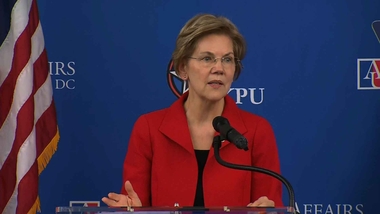Why Elizabeth Warren's 'likability' won't matter

She's running. That much was made clear this week. But no sooner had Sen. Elizabeth Warren ended years of anticipation by announcing her exploratory committee than the conversation turned to her "likability."
Even if it were a fair metric without overtones of sexism, likability has not been a very good way to judge Elizabeth Warren's political strength throughout her career. My company has been polling Massachusetts voters about Warren going back to her first campaign, which began in late 2011.
Warm feelings from voters have never been at the heart of Warren's success. It would be mistake for anyone to try to predict her presidential chances based on her perceived affability. She has risen more on her reputation as a reliable ally of everyday voters rather than someone voters would invite to the proverbial backyard barbecue.
She won in 2012 over incumbent Sen. Scott Brown, who made likability absolutely central to his brand. His ubiquitous barn coat and pickup truck all but whistled their own everyman tunes, and his high favorability numbers showed it. Just two years before Warren bested him, he held the distinction of being "the most popular officeholder in Massachusetts."
Compared with Warren, he was far more "likeable." In fact, in a Boston Globe poll midway through the race, Brown was rated more likeable by 57% of Massachusetts voters, compared with Warren's 23%. Then she beat him, even while holding lower net favorables (+13) than Brown (+22) on Election Day, according to CNN's 2012 exit polls. Put another way, Warren was never as "likeable" as Scott Brown, but she won anyway.
Polls conducted in the lead up to Election Day told a similar story with more detail. Coming down the home stretch of that campaign, just 26% of voters thought that a candidate's likability was "very important" to their vote, the least important of any attribute included in the poll. Far more important to voters were finding someone who agreed with them and who would stand up for their interests. When asked to compare the candidates, more voters saw Warren as fitting the bill on both fronts.
Since her election in 2012, Warren has held a very stable favorability rating. AP VoteCast data (their replacement for exit polls) found her with a 57% favorability rating on Election Day 2018, just a point from the 56% figure in 2012. Between election cycles, Warren never hit the extremely high favorables enjoyed by Republican Gov. Charlie Baker, in large part because she remains underwater with the state's relatively small share of Republican voters, as she has been since her first campaign.
She also never dipped low overall, holding a very steady level of support. She handily defeated her Republican opponent, Geoff Diehl, who suffered from a lack of name recognition and his 2016 ties to President Donald Trump, who is less popular in Massachusetts than most other states.
Indeed, Trump himself provides a solid example of the limits of likeability as a metric for forecasting political success. Neither he nor Hillary Clinton were very popular with the general electorate, with their favorability numbers plumbing the depths of presidential campaign history. Even so, they vanquished their primary opponents, appealing to enough members of their parties to move on.
At the risk of oversimplifying, Warren's task is the same: she must defeat her primary opponents, which may or may not involve getting a majority of voters to like her.
In this era of fierce partisan confrontation. It's not at all clear that Democratic primary voters need to like their candidates to vote for them. It is very possible they want someone whose campaign will leave "plenty of blood and teeth left on the floor," to use Warren's own words from a past political dust up. We are still a year away from any votes being cast, and have no idea which attributes voters may prioritize, or how candidates may seek to differentiate themselves.
It also needs to be said that Massachusetts voters don't have a great track record, at least recently, of identifying winning presidential candidates. Former Massachusetts Sen. John Kerry and former Govs. Mitt Romney, Bill Weld, and Mike Dukakis all had stellar electoral records in the Bay State, but none made it to the White House.
Running as a blue state Republican doesn't seem to get you much. Mitt Romney is now a senator from Utah, and Bill Weld turned Libertarian vice presidential candidate on his way to earning 3% of the vote in the 2016 campaign. Then again, popular Massachusetts Democrats also haven't risen further -- Kerry and Dukakis each lost to their Republican opponents.
In a tidy rhyme of electoral history, John F. Kennedy won Massachusetts in the 1960 election with 60% of the vote -- the same margin with which Warren just won her Senate reelection.
Such coincidence aside, there is nothing about her record in Massachusetts elections that tells us much about the likelihood of presidential success. Rather than burying Warren's bid under a shovelful of made up metrics about candidate quality, let's let voters compare her to other candidates who choose to follow her onto the trail.
By Steve Koczela. The-CNN-Wire™ & © 2019 Cable News Network, Inc., a Time Warner Company. All rights reserved.
The Gayly – January 8, 2019 @ 3:10 p.m. CST.





